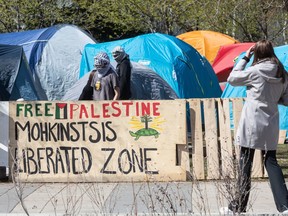
Article content
As we follow protests around the world, we hear people arguing that they pay taxes and that their free speech rights should also extend to the “right” to occupy property. But there have always been limits – and governments need to enforce the laws and regulations to protect people and those spaces.
I’ve served in elected office, and know that once governments stop enforcing the rules, they damage their ability to step in (either with the public or in court) when things get out of control. A judge (or the public) would reasonably question why they didn’t act earlier when they could have prevented escalation or damage.
Advertisement 2
Article content
Article content
These protests and staged conflicts unfold in similar ways. Marches, demands being made and then occupying property. In the past, these were local and organic. Today, some have evolved into publicity stunts supported by well-funded activist groups focused on disruptive experiments.
We saw this in 2020 where part of Seattle was occupied. During this “Summer of Love,” police abandoned a precinct, blockades were erected, shootings, sexual assaults and confrontations by armed activists caused people to live in fear. One resident noted that the area “turned into a militant cult.”
We’ve also seen this happen with global summits and events where violence, looting and law enforcement being overrun often occurs. But here in Alberta, and particularly in Calgary, it seems to unfold differently.
When the Calgary region hosted the 2000 World Petroleum Congress and 28th G-8 Summit, we braced for violence. The Calgary Police Service took a different tactical and communications approach to keep disruptions in check and deal with anarchists and groups targeting these events. When protestors recently marched onto the University of Calgary campus with gear in tow to protest the ongoing battle between Israel and Hamas in the Middle East, police prevented encampments from taking root and escalating.
Article content
Advertisement 3
Article content
In Western Canada, we take a different approach to disagreements that have been burned into many of us over generations. We encourage healthy debate, with civility and respect for public and private property. That happens regularly, and most people generally take it in stride.
People walking down a street, stopping at an intersection for a short speech then continuing along is seen as fair. Getting a permit and protesting on the steps of City Hall is also legitimate. Walking through a university campus and chanting is a long-recognized way to exercise free speech. Bringing in portable toilets, tents, generators, refrigerators and other equipment crosses into an occupation. Saying you won’t leave until your demands are met makes it hard to resolve things. When you occupy property, you’re infringing on the owner’s rights.
I’m not a lawyer, but simply put, free speech is the right to speak freely on either side of a debate. A college or university may be publicly funded, but there’s a structure in place to receive money, pay bills and oversee its affairs. The same with the roads and bridges we use – it’s owned under the responsibility of a level of government.
Advertisement 4
Article content
Article content



